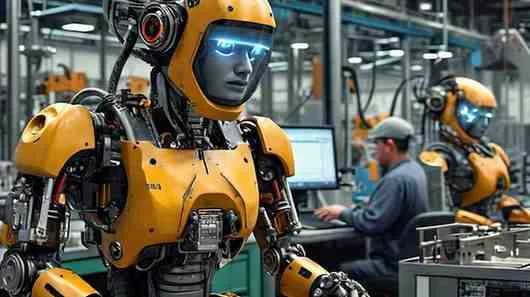AI is transforming the way we live, work, and interact with the world. Discover how the future of AI will impact industries, jobs, and our daily lives.
Let's explore The Future of AI and Its Uses.
 |
| AI-driven personalized suggestions improve user experience |
Artificial Intelligence (AI) is more than just a buzzword these
days—it's a technological revolution that's changing how we interact with the
world around us. From voice assistants like Siri and Alexa to
personalised recommendations on Netflix, AI is already integrated into our
daily lives.
But what lies ahead for AI? As we look toward the future, AI will
impact industries such as education, healthcare, and urban development in ways
we are only beginning to imagine. In this article, we’ll explore the exciting
future of AI and how it will shape our lives.
AI
for Personalization: Shaping the World Around You
AI’s ability to make experiences more personalised is one of its most powerful features. AI, with its huge collection of data, can understand your preferences, habits, and needs better than ever before, offering suggestions and services tailored specifically to you.
 |
AI offers personalized shopping recommendations based on user preferences.
Whether you're shopping online, learning a new skill, or managing your health, AI will make sure the experience is customized to meet your unique needs.
AI
in Education: Learning Tailored Just for You
Have you ever struggled with a subject in school while excelling in
other subjects? In the future, AI will help solve that problem by offering a
completely personalized learning experience.
AI systems will be able to analyse each student's strengths and
weaknesses and create a learning plan just for them. No more one-size-fits-all
classrooms—every student will get the help they need to succeed, whether it’s
through interactive lessons or AI-powered tutoring systems.
 |
AI enhances learning by offering personalized study paths for each student. |
AI will be helpful not just for students, but it will help teachers
as well. By evaluating student progress, AI can give educators insights into
where students are struggling and provide recommendations on how to improve
lessons. This could lead to a future where education is not only more engaging
but also more effective for every learner.
AI
in Healthcare: Personalizing Treatments and Monitoring Health
In healthcare, AI's potential to offer personalized care is truly
groundbreaking. Imagine wearing a health device that monitors your vitals and
alerts you or your doctor if something’s wrong before you even feel it. In the
future, AI-powered devices will monitor real-time health data and deliver
personalized treatments tailored to your body’s specific needs. Whether you’re
managing a chronic condition or looking to improve your overall health, AI will
guide you with real-time insights and customized solutions.
 |
AI-powered wearable devices help monitor health in real-time for more accurate treatments |
AI
and the Future of Work: Collaborating with Machines
A lot of people worry about AI taking over jobs, but the fact is
that AI is more likely to change jobs rather than replace them.
AI will handle repetitive, time-consuming tasks, allowing humans to
focus on more creative and strategic work. Think of it this way: instead of
replacing workers, AI will become the ultimate assistant, helping you do your
job better and faster.

AI robots assist humans in factories by
automating repetitive tasks while humans oversee operations.
AI
in Factories: Increasing Efficiency While Keeping Jobs
In the future, AI-powered robots will handle tasks like assembly
line work, quality control, and inventory management. These machines will be
faster and more efficient than humans, reducing errors and improving
productivity.
However, humans will still play an important role. We will have to
take control of the robots, troubleshoot problems, and handle the complex
decision-making that AI can’t.

AI improves factory efficiency while humans
handle complex decision-making tasks.
The key to this transformation is collaboration. Instead of humans
competing with machines, AI will work alongside us, helping us work smarter,
not harder. In industries like manufacturing, AI could help manage dangerous or
physically demanding tasks, keeping humans safer.
AI
in the Gig Economy: Empowering Freelancers
The gig economy—where people take on short-term jobs or freelance
projects—will also be impacted by AI. Imagine an AI system that finds the
perfect job for you based on your skills, availability, and past work
experience. Freelancers could use AI to find jobs that not only match their
abilities but also help them grow professionally.
 |
| AI helps freelancers find gigs that align with their skills and availability, enhancing their career opportunities. |
AI will also help freelancers manage their schedules, track
deadlines, and even suggest ways to improve their skills. This kind of smart
assistance will make it easier for gig workers to find the best opportunities
while maintaining work-life balance.
Ethical
AI: Addressing Challenges Before They Arise
As AI continues to evolve, so do the ethical questions surrounding
it. While AI can make life easier, we need to ensure it’s used responsibly.
Issues like bias in AI algorithms, data privacy, and job displacement are
concerns that must be addressed as AI becomes more integrated into society.
Tackling
Bias in AI Systems
One major challenge is ensuring that AI systems make fair and
unbiased decisions. AI learns from data, and if the data it’s trained on
contains biases, the AI can unintentionally reinforce those biases. For
example, in hiring processes, if an AI system is trained on biased data, it
might favor certain groups of people over others. As AI becomes more involved
in decision-making, it’s critical to ensure fairness and prevent
discrimination.
Developers must ensure that AI systems are trained on diverse, unbiased data.
Ensuring
Data Privacy
Another concern is data privacy. AI relies on huge amounts of data to function, but we need to make sure our personal information is kept safe. In the future, there will be strict regulations and standards to ensure AI systems use data responsibly, ensuring user privacy and security.
AI
in Smart Cities: Building Safer, More Efficient Urban Spaces
One of the most exciting future applications of AI is in the
development of smart cities. AI will play a key role in making cities safer,
more efficient, and more sustainable. From traffic management to energy
conservation, AI will optimize urban living.

AI will revolutionize urban living, managing
resources and improving city efficiency.
AI
for Traffic Management: Smoother, Faster Commutes
Imagine your morning commute with zero traffic jams. AI-powered
traffic management systems will analyse real-time data from vehicles and
infrastructure, adjusting traffic signals and suggesting optimal routes to keep
traffic flowing smoothly.
AI will even predict accidents and congestion before they happen,
saving time and reducing frustration for drivers.
|
Smart City Application |
How AI Helps |
|
Traffic
Management |
AI
optimizes traffic lights, reduces congestion, and predicts accidents. |
|
Energy
Efficiency |
AI
manages energy use in buildings to reduce waste and improve sustainability. |
|
Public
Safety |
AI
monitors public spaces for safety and helps emergency responders arrive
faster. |
.jpeg)
AI-powered traffic systems reduce congestion and improve public safety in smart cities.
AI
for Public Safety: Keeping Cities Secure
AI is transforming urban safety, going beyond smarter traffic
management to create secure and responsive cities. With AI-infused
surveillance, authorities can stay one step ahead of potential threats,
intervening early to prevent harm.
When emergencies arise, AI optimizes response times, directing
first responders to the scene swiftly and accurately, and ultimately, saving
lives.
Conclusion
The future of AI is filled with exciting possibilities. From
personalizing our everyday experiences to revolutionizing industries like
healthcare, education, and urban planning, AI will touch every part of our
lives. However, it’s important to approach this future with caution, ensuring
that AI is developed ethically, fairly, and with respect for our privacy. AI
won’t replace humans—it will work alongside us, making our jobs easier, our
cities smarter, and our lives more personalized. As AI continues to evolve, the
world it creates will be one of endless possibilities, where technology and
humanity work hand in hand to build a better future for all.
FAQs
About AI
How will AI change education?
AI will provide personalized lessons tailored to each student’s learning style, helping improve educational outcomes.
Will AI take over jobs?
AI will likely change the nature of work by automating repetitive tasks, but it will also create new opportunities for human collaboration and creativity.
What challenges does AI pose?
Key challenges include ensuring AI makes unbiased decisions, protecting data privacy, and managing its impact on jobs and society.
How can AI improve urban living?
AI will make cities smarter by managing traffic, improving energy efficiency, and enhancing public safety.
Which industries will benefit most from AI?
Healthcare, education, finance, manufacturing, and urban development will see significant advancements due to AI.
What steps can we take to ensure AI is ethical?
To ensure AI is ethical, we need to create regulations that prevent bias, protect privacy, and encourage transparency in AI systems.


.png)






















0 Comments